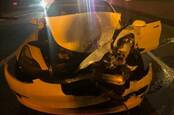This article is more than 1 year old
Whoa, whoa... Tesla slams brakes on allegations of 'unintended acceleration' bug: 'Completely false and was brought by a short-seller'
Grimes' boyfriend's biz says it's under financial attack
Tesla is rubbishing complaints of a possible software-related gremlin causing its line of electric cars to suddenly speed up.
The luxury automaker on Monday issued a statement emphatically denying allegations that three of its models were prone to "unintended acceleration" while on the road. The complaints were submitted earlier this month to America's transport watchdog.
According to the claims, there appears to be no rhyme nor reason why the unexpected acceleration occurs: it can happen while parking, for instance, it is alleged. Tesla hinted that the problem may well be due to human error – that folks pressed the wrong pedal and the cars were just doing what they were told.
The Elon Musk-owned automaker added that, even if there was a system fault, there are safeguards in place to prevent vehicles from shooting off if the accelerator pedal's position was misread.

Tesla has a smashing weekend: Model 3 on Autopilot whacks cop cars, Elon's Cybertruck demolishes part of LA
READ MORE"While accidents caused by a mistaken press of the accelerator pedal have been alleged for nearly every make/model of vehicle on the road, the accelerator pedals in Model S, X and 3 vehicles have two independent position sensors, and if there is any error, the system defaults to cut off motor torque," Tesla said.
"Likewise, applying the brake pedal simultaneously with the accelerator pedal will override the accelerator pedal input and cut off motor torque, and regardless of the torque, sustained braking will stop the car."
This comes after word broke that the US National Highway Traffic Safety Administration (NHTSA) was mulling over a public petition [PDF] asking it to investigate the apparent issue and recall a reported 500,000 Tesla model S, X, and 3 vehicles over the claims they were prone to suddenly taking off at high speed.
The petition includes multiple allegations by Tesla owners of their cars mistakenly speeding up. For example, one claims:
As I was making a 90-degree turn to park, your record would certainly show that I pressed the breaks [sic] during the turn. The only way I could have put the car in the high acceleration - that my wife and I noticed - would be that I lifted my feet from the break [sic] and instantly pressed very hard on the accelerated paddle. I cant understand how that be feasible. If the record does not show this precise pattern, than it points to a potential software flaw.
The NHTSA has yet to issue any sort of ruling on the petition. According to Tesla, this petition is less about public safety than it is about turning a quick buck for a single investor who compiled the petition and has allegedly taken a short position on Tesla shares.
"This petition is completely false and was brought by a Tesla short-seller," Tesla says in its clap-back.
"We investigate every single incident where the driver alleges to us that their vehicle accelerated contrary to their input, and in every case where we had the vehicle's data, we confirmed that the car operated as designed. In other words, the car accelerates if, and only if, the driver told it to do so, and it slows or stops when the driver applies the brake."
Shares in Tesla have fallen from $543 on January 14 to $510 at closing on the 17th. The markets were closed on Monday for the Martin Luther King Day. ®
